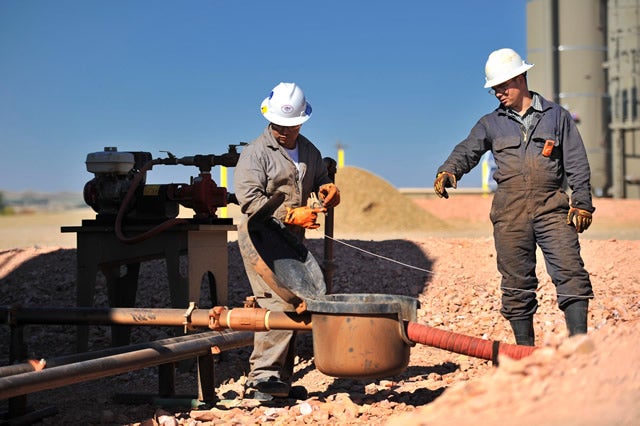
Kenny LeBaron, left, and his brother Joshua moved to North Dakota from Minnesota to take advantage of higher salaries due to an oil boom there. Here they service a gas and oil well near Watford City, North Dakota, on September 27, 2011. (Glen Stubbe/Minneapolis Star Tribune/MCT)
What do you know—“Drill, baby, drill” is working.
Thanks to new smart-drilling and production technologies (including hydraulic fracturing), the U.S. is the leading liquid fuels producer in the world and will soon be the world’s largest producer of petroleum. And we would be even further in the lead if we had pro-growth federal energy policies.
The latest news shows that Texas oil production doubled in just the last three years and is the highest it’s been since at least 1981. North Dakota is now the second-largest oil-producing state and sets a new production record virtually every day, and the U.S. is set to surpass Saudi Arabia as the world’s largest petroleum producer. This new production provides a cushion that helps insulate oil markets from the price spikes we might have seen with the continuing turmoil in the Middle East—from the Arab Spring to the nonstop threats from Iran.
According to President Obama, our newfound oil leadership must be a mirage, since he has consistently downplayed the benefit of increased domestic oil production.
In March 2010, President Obama claimed that increasing oil production was futile, since “[t]he United States consumes more than 20 percent of the world’s oil, but we only have 2 percent of the world’s oil reserves—20 percent we use; we only produce 2 percent.” In addition to committing a two-Pinocchio fraud, he totally confuses reserves and production.
Undeterred by having even The Washington Post call him out for misleading the public, Obama keeps repeating this nonsensical statistic. For instance, in March 2012, he said, “As a country that has 2 percent of the world’s oil reserves, but uses 20 percent of the world’s oil—I’m going to repeat that—we’ve got 2 percent of the world oil reserves; we use 20 percent.” He went on to say there’s not much hope for the U.S. in increasing oil production.
Of course, “drill, baby, drill” could work even better if the federal government would allow reasonable access to non-park, non-wilderness reserves. However, mired in the faulty logic of the President’s “2 percent of reserves” mentality, the federal government has been MIA in the current U.S. oil boom, which has occurred almost exclusively on state and private lands.
As good fortune would have it, people in the oil industry ignored President Obama’s declarations of meager reserves and drilled anyway. Since Obama’s March 2012 statement, U.S. oil production has risen 23 percent. Since the March 2010 quote, U.S. oil production has risen 45 percent. Even ignoring the moderating impact on oil prices, the increase in production since June 2010 cuts our imported energy bill by about $100 billion per year. Which brings us to the final irony—the President now takes credit for this increased production.

























